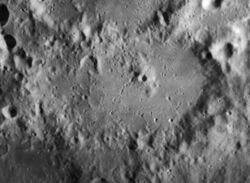Astronomy:Regiomontanus (crater)
 Lunar Orbiter 4 image | |
| Diameter | 126 × 110 km |
|---|---|
| Depth | 1.7 km |
| Colongitude | 2° at sunrise |
Regiomontanus is an ancient lunar impact crater located in the southern highlands region to the southeast of Mare Nubium. It is joined at the chaotic northern rim by the crater Purbach, and to the south-southeast is Walther.
Characteristics
The crater is heavily worn from impact erosion, and the rim is irregular, mountainous and distinctly oval in outline. The walls on the southern and western edges have been almost completely degraded. A prominent ridge lies off-center to the northwest, with the small crater Regiomontanus A at its summit. The crater floor is lava-flooded, and has a number of small crater impacts.
The summit crater Regiomontanus A was once considered proof of volcanic activity on the Moon. However this feature is actually an impact crater, and is offset slightly from the summit of the central peak.
Name
Regiomontanus is named after the 15th century German astronomer and mathematician Johannes Müller von Königsberg, known as Regiomontanus.[1] Like many of the craters on the Moon's near side, it was given its name by Giovanni Riccioli, whose 1651 nomenclature system has become standardized.[2] Earlier lunar cartographers had given the feature different names. Michael van Langren's 1645 map calls it "Christinae Reg. Suec." after Christina, Queen of Sweden.[3] And Johannes Hevelius grouped it with Purbach and Walther as "Mons Libanus" after Mount Lebanon.[4]
Satellite craters

By convention these features are identified on lunar maps by placing the letter on the side of the crater midpoint that is closest to Regiomontanus.
| Regiomontanus | Latitude | Longitude | Diameter |
|---|---|---|---|
| A | 28.0° S | 0.6° W | 6 km |
| B | 29.0° S | 3.7° W | 10 km |
| C | 28.7° S | 5.2° W | 8 km |
| E | 28.2° S | 6.2° W | 6 km |
| F | 27.8° S | 1.9° W | 11 km |
| G | 28.2° S | 3.6° W | 5 km |
| H | 28.6° S | 4.0° W | 6 km |
| J | 29.4° S | 1.9° W | 8 km |
| K | 30.3° S | 0.0° W | 6 km |
| L | 29.7° S | 1.1° E | 6 km |
| M | 29.6° S | 2.1° W | 5 km |
| N | 28.9° S | 0.1° E | 3 km |
| R | 28.4° S | 0.0° W | 3 km |
| S | 28.6° S | 2.0° W | 4 km |
| T | 28.1° S | 2.9° W | 5 km |
| U | 27.9° S | 3.5° W | 11 km |
| W | 29.5° S | 1.4° W | 3 km |
| Y | 30.1° S | 1.6° W | 5 km |
| Z | 27.5° S | 3.0° W | 6 km |
References
- ↑ "Regiomontanus (crater)". Gazetteer of Planetary Nomenclature. USGS Astrogeology Research Program.
- ↑ Ewen A. Whitaker, Mapping and Naming the Moon (Cambridge University Press, 1999), p.61.
- ↑ Ewen A. Whitaker, Mapping and Naming the Moon (Cambridge University Press, 1999), p. 198.
- ↑ Ewen A. Whitaker, Mapping and Naming the Moon (Cambridge University Press, 1999), p. 205.
- Andersson, L. E.; Whitaker, E. A. (1982). NASA Catalogue of Lunar Nomenclature. NASA RP-1097.
- Bussey, B.; Spudis, P. (2004). The Clementine Atlas of the Moon. New York: Cambridge University Press. ISBN 978-0-521-81528-4.
- Cocks, Elijah E.; Cocks, Josiah C. (1995). Who's Who on the Moon: A Biographical Dictionary of Lunar Nomenclature. Tudor Publishers. ISBN 978-0-936389-27-1. https://archive.org/details/isbn_9780936389271.
- McDowell, Jonathan (July 15, 2007). "Lunar Nomenclature". Jonathan's Space Report. http://host.planet4589.org/astro/lunar/.
- Menzel, D. H.; Minnaert, M.; Levin, B.; Dollfus, A.; Bell, B. (1971). "Report on Lunar Nomenclature by the Working Group of Commission 17 of the IAU". Space Science Reviews 12 (2): 136–186. doi:10.1007/BF00171763. Bibcode: 1971SSRv...12..136M.
- Moore, Patrick (2001). On the Moon. Sterling Publishing Co. ISBN 978-0-304-35469-6. https://archive.org/details/patrickmooreonmo00patr.
- Price, Fred W. (1988). The Moon Observer's Handbook. Cambridge University Press. ISBN 978-0-521-33500-3.
- Rükl, Antonín (1990). Atlas of the Moon. Kalmbach Books. ISBN 978-0-913135-17-4.
- Webb, Rev. T. W. (1962). Celestial Objects for Common Telescopes (6th revised ed.). Dover. ISBN 978-0-486-20917-3. https://archive.org/details/celestialobjects00webb.
- Whitaker, Ewen A. (1999). Mapping and Naming the Moon. Cambridge University Press. ISBN 978-0-521-62248-6.
- Wlasuk, Peter T. (2000). Observing the Moon. Springer. ISBN 978-1-85233-193-1.
 |


